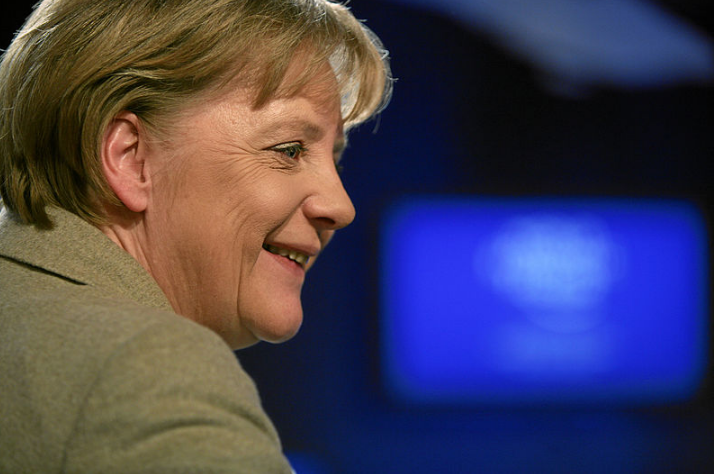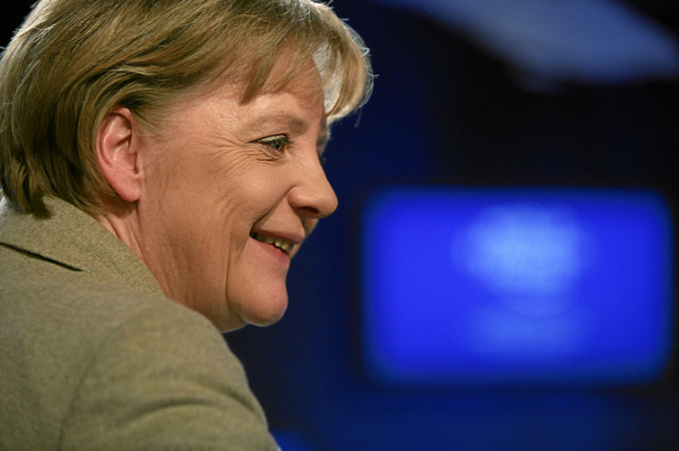Angela Merkel decided to present her candidature for the post of Chancellor of the fourth period. She declared this yesterday, initially at a meeting of the party’s political council, and then publicly, speaking to reporters. "I thought about this step ever so long - 62-year-old Angela Merkel admitted yesterday. - And this decision is certainly not trivial, neither for the country nor for the party, nor for me personally."
Back in 2014, the German media would speculate about possibility of her premature voluntary retirement. Last year, however, Der Spiegel reported that Ms. Merkel, who has served as CDU chairman since 2000 and as Head of the government since 2005, was going to run for both posts and was discussing this prospect with her advisers. The newspaper was only unsure of when and under what circumstances Angela Merkel would announce her intentions.
Now, Ms. Merkel has to be approved as Chairman of the CDU, and a candidate from the party at the congress in Essen on 6 December. If she wins the elections for the fourth time (2005, 2009, 2013 and now in 2017), she will have a good chance to set a record by period of office. In this case, Ms. Merkel would surpass both Founder of the CDU Konrad Adenauer (chancellor from 1949 to 1963), and "the Unifier of Germany" Helmut Kohl (1982 to 1998).
On the same day, Emnid published a study, which showed Merkel's rise in popularity after a significant dip in recent months. More than half of Germans said they would support her in case of nomination for the post of Chancellor of Germany for the fourth term. 55% of respondents expressed their support for her. Another 39% were against, which is 11 percentage points less than August’s result (50% / 42%).
Every day there are more differences occurring in Europe. Many of local citizens expect from Germany, the richest state, an ability to cope with a lot of European issues, many of which have been around for a very long time: weak growth, endless stream of refugees and dissatisfied and nationalist electorate.
Political situation in Italy and Spain is quite unstable, Austria in December can choose ultra-President, and Ms. Merkel is going to face extremely difficult negotiations with the United Kingdom in connection with Brexit.
Given Mr. Trump’s "America First" attitude, and the fact that he is calling into question value of the NATO alliance, Germany will have to play a much greater role in the European security system.
Over the past eight years, Ms. Merkel could rely on continued support of President Obama and the Elysee Palace. However, election of Mr. Trump and a sharp drop in President Francois Hollande's popularity deprived her of this vital support.
Those, who have worked closely with Ms. Merkel, are saying that she is tired to deal with Europe’s problems. Her inner circle is now occupying a more defensive position after the last migration crisis, which seriously weakened belief in Ms. Merkel.
"She is the last authoritative leader, which makes her both strong and weak - said Stefan Kornelius, one of her biographers and political analyst at Süddeutsche Zeitung. - She is a foundation of stability, the last wall, and people want to rely on her."
source: spiegel.de, nytimes.com
Back in 2014, the German media would speculate about possibility of her premature voluntary retirement. Last year, however, Der Spiegel reported that Ms. Merkel, who has served as CDU chairman since 2000 and as Head of the government since 2005, was going to run for both posts and was discussing this prospect with her advisers. The newspaper was only unsure of when and under what circumstances Angela Merkel would announce her intentions.
Now, Ms. Merkel has to be approved as Chairman of the CDU, and a candidate from the party at the congress in Essen on 6 December. If she wins the elections for the fourth time (2005, 2009, 2013 and now in 2017), she will have a good chance to set a record by period of office. In this case, Ms. Merkel would surpass both Founder of the CDU Konrad Adenauer (chancellor from 1949 to 1963), and "the Unifier of Germany" Helmut Kohl (1982 to 1998).
On the same day, Emnid published a study, which showed Merkel's rise in popularity after a significant dip in recent months. More than half of Germans said they would support her in case of nomination for the post of Chancellor of Germany for the fourth term. 55% of respondents expressed their support for her. Another 39% were against, which is 11 percentage points less than August’s result (50% / 42%).
Every day there are more differences occurring in Europe. Many of local citizens expect from Germany, the richest state, an ability to cope with a lot of European issues, many of which have been around for a very long time: weak growth, endless stream of refugees and dissatisfied and nationalist electorate.
Political situation in Italy and Spain is quite unstable, Austria in December can choose ultra-President, and Ms. Merkel is going to face extremely difficult negotiations with the United Kingdom in connection with Brexit.
Given Mr. Trump’s "America First" attitude, and the fact that he is calling into question value of the NATO alliance, Germany will have to play a much greater role in the European security system.
Over the past eight years, Ms. Merkel could rely on continued support of President Obama and the Elysee Palace. However, election of Mr. Trump and a sharp drop in President Francois Hollande's popularity deprived her of this vital support.
Those, who have worked closely with Ms. Merkel, are saying that she is tired to deal with Europe’s problems. Her inner circle is now occupying a more defensive position after the last migration crisis, which seriously weakened belief in Ms. Merkel.
"She is the last authoritative leader, which makes her both strong and weak - said Stefan Kornelius, one of her biographers and political analyst at Süddeutsche Zeitung. - She is a foundation of stability, the last wall, and people want to rely on her."
source: spiegel.de, nytimes.com



















